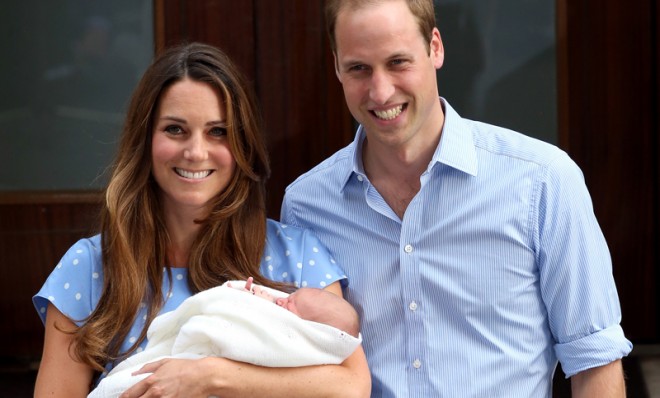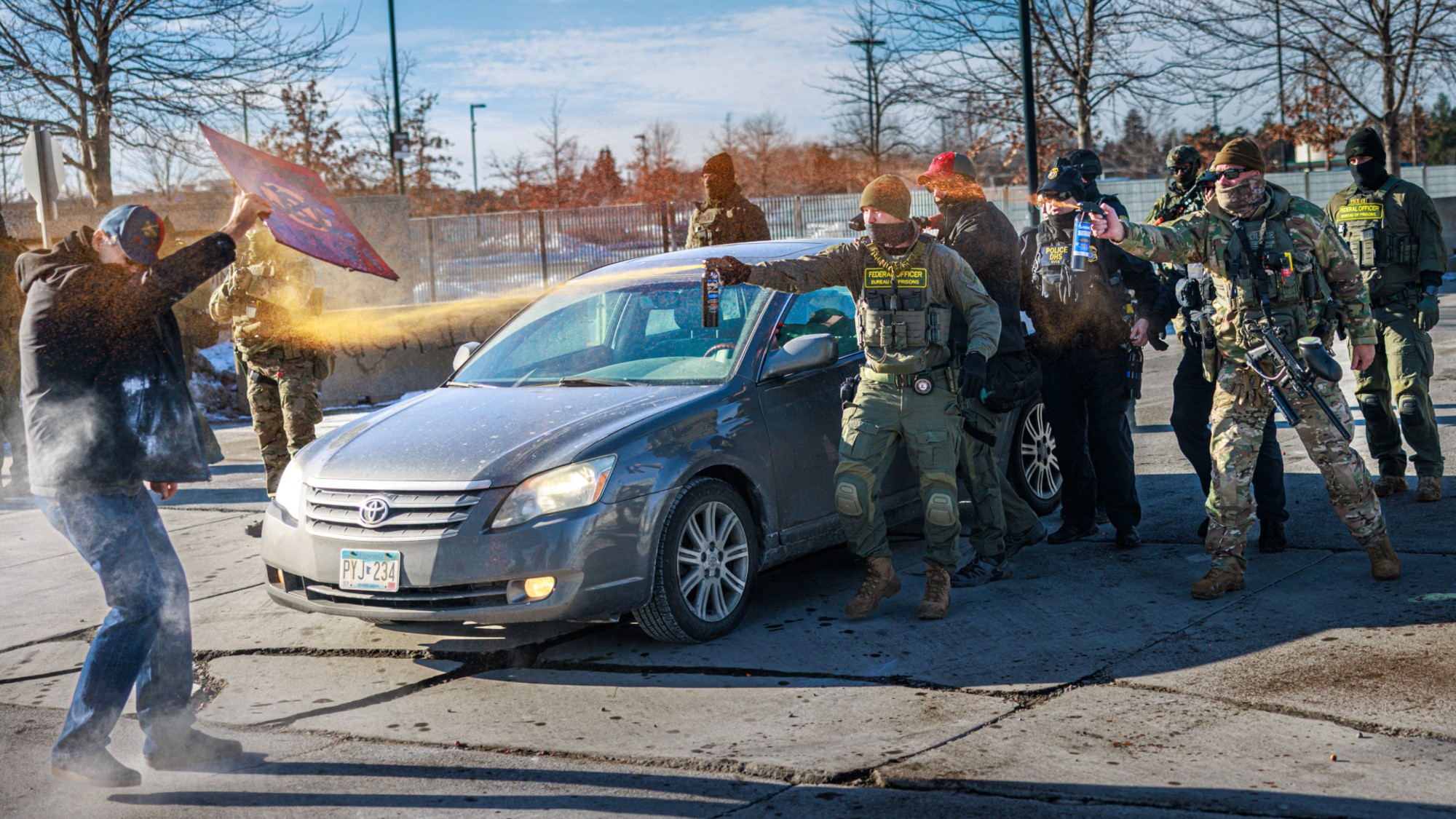A brief history of royal baby names
Will and Kate's wee one will be the seventh British king to be called George


It's official! Will and Kate have had a baby future king! And he has three names: George Alexander Louis. This is actually fewer than his father (William Arthur Philip Louis) or grandfather (Charles Philip Arthur George). The royals like to have plenty of first names, perhaps to make up for not actually having last names as such. Edward VIII, who reigned less than a year, had seven names — Edward Albert Christian George Andrew Patrick David.
With all those names, you might think the British royal baby name book would be pretty thick. But actually, it's awfully thin, because the same names keep getting used over and over again. Tradition and heritage are very important for royals, so they tend to get their names from ancestors — and which ancestors they're named after can be significant. It raised a lot of eyebrows when William's younger brother was named Henry (you know him as Harry), since the last king with that name was Henry VIII, who was problematic. But it's OK, as long as Prince Harry doesn't end up king.
We can skip over the names from before AD 1066, when William the Conqueror came over from France and took over, because names such as Eadwig and Æthelred aren't really in play anymore. Since 1066, there have been 39 kings of Britain or England (not counting a couple of disputed claimants). And between them, they have used a grand total of… drum roll… 21 names. But to be fair, monarchs of Britain only started being given more than one name with George I, christened George Louis.
The Week
Escape your echo chamber. Get the facts behind the news, plus analysis from multiple perspectives.

Sign up for The Week's Free Newsletters
From our morning news briefing to a weekly Good News Newsletter, get the best of The Week delivered directly to your inbox.
From our morning news briefing to a weekly Good News Newsletter, get the best of The Week delivered directly to your inbox.
There have been queens of Britain or England, of course — six of them since 1066 (not counting the disputed ones). The baby name book for British queens is too small to bother with: the names used so far are Elizabeth, Mary, Anne, Victoria, Alexandra (in Elizabeth Alexandra Mary), and Alexandrina (in Alexandrina Victoria).
Here, then, is the British royal baby name book for boys, in order of popularity.
George
The patron saint of England is a popular one, having been used nine times, six of which were for actual kings (make that seven when the newest addition takes the throne). Prince Charles Philip Arthur George, also has it, as did Edward VIII, who had the names of all four patron saints of Great Britain (George, Andrew, Patrick, David), but abdicated and married an American divorcée. There's only one other name that has been used as much…
A free daily email with the biggest news stories of the day – and the best features from TheWeek.com
Henry
Oh dear. That inconvenient Henry VIII and his six wives. The only monarch to use the name since was William Henry, a.k.a. William IV, but his father, George III, had an excuse: William had two older brothers and was not expected to become king — and in fact he didn't until his older brothers died without a surviving heir.
Edward
If you've been paying attention, you know that this name had to be up there in the count, because there was a King Edward VIII. Yes, and all kings with Edward in their names have had it as their reigning name. (Edward VII was actually Albert Edward.) That gives it eight appearances and ties it for first place as the most popular name for kings — and it's much more popular recently than Henry, that's for sure. And if we bring in the kings before 1066, we also get Edward the Confessor and Edward the Martyr, to make Edward the most popular of all English king names.
William
There have been six Williams, including our current Prince William; four of them have been King William, and only the fourth one even had another name — Henry (were you paying attention above?). But the first one, William the Conqueror, was a pretty big deal.
Albert
Queen Victoria's prince consort had this name before any kings did — then her son, grandson, and two great-grandsons all became king with this name on their birth certificates, one of them with it in first place, even. Yet there has never been a King Albert. The one who could have been, Edward VII's son Albert Victor, died before he got the crown.
Frederick
The last four King Georges all had this name in their set. There hasn't been a King Frederick, but there would have been if George III's brother Frederick hadn't died. It's also been a very popular name for royals in other Germanic countries, such as Prussia and Denmark.
Charles
Charles is tied with four other names that have been used three times each. There have been two kings by this name, both back in the 1600s, but there will be a third one… as long as the succession doesn't skip to William V. This name has been popular among European royalty every since the Holy Roman Emperor Charles the Great, better known as Charlemagne.
Arthur
George VI (Albert Frederick Arthur George) was the first king to have this name in his set. And remember, this was the former Prince Albert, who was not expected to become king — his brother went and fell for that American and abdicated. George VI and Prince Charles also sport this one.
Louis
This seems a rather French name for an English king, doesn't it? And yet Prince George (the baby) and Prince William both have it, and so did George I, who was George Louis… and he was a German import. But Prince William got the Louis from his great-uncle, Earl Mountbatten.
Philip
The husband of Elizabeth II is, as I'm sure you know, Prince Philip. His grandson and great-grandson both have Philip in their names. And so did King Philip. Who? He was the husband of Queen Mary (Tudor) and, by law, shared her title.
Richard
There were three Richards. Given how well Richard III is thought of, it seems unlikely we shall see a fourth — or even another king with Richard anywhere in his name.
James
There were two King Jameses, and since then the name has been nowhere to be seen. Some people were betting on Will and Kate's baby being named James. I think a fine name has been overlooked here!
Augustus
Yes, there have been two Augustuses (Augusti?) among England's kings' names: George II (George Augustus) and George IV (George Augustus Frederick). The first one got it from his grandfather, Ernest Augustus, Elector of Hanover. Remember — George I was a German import.
Alexander
Now we're into the one-offs, and the first is in the new prince's name. But Alexander is only sort of a one-off: Elizabeth II is Elizabeth Alexandra Mary, and Victoria was Alexandrina Victoria — her godfather was Alexander I of Russia. There were also three kings of Scotland named Alexander long ago. And let us not forget Alexander the Great, the original world conqueror. But there is also some suggestion that Kate's family were pulling for the name.
Christian
This was one of Edward VIII's seven. It came from his great-grandfather, Christian IX of Denmark.
Andrew
Prince Charles's brother is Prince Andrew, of course. But only one king has had this name in his set: Edward VIII, who had it because Andrew is the patron saint of Scotland.
David
It's Edward VIII again. David is the patron saint of Wales.
Patrick
Patron saint of Ireland. Edward VIII again. See the pattern?
Ernest
George V was George Frederick Ernest Albert. He was also a younger brother — his older brother, Albert Victor, died before he could become king. So his father, Edward VII, didn't think he was giving this name to a future king.
John
There has been one John, and he was by general accounts the sort of king no king after him would want to be named for. This name has done much better among popes, racking up 23.
Stephen
And then there was King Stephen. Who? He reigned in the mid-1100s. He was the grandson of William the Conqueror. And there hasn't been another Stephen since. His claim to the throne was disputed by Empress Matilda. Stephen and Matilda? Sounds like the couple down the block…
James Harbeck is a professional word taster and sentence sommelier (an editor trained in linguistics). He is the author of the blog Sesquiotica and the book Songs of Love and Grammar.
-
 Striking homes with indoor pools
Striking homes with indoor poolsFeature Featuring a Queen Anne mansion near Chicago and mid-century modern masterpiece in Washington
-
 Why are federal and local authorities feuding over investigating ICE?
Why are federal and local authorities feuding over investigating ICE?TODAY’S BIG QUESTION Minneapolis has become ground zero for a growing battle over jurisdictional authority
-
 ‘Even those in the United States legally are targets’
‘Even those in the United States legally are targets’Instant Opinion Opinion, comment and editorials of the day
-
 In the future, will the English language be full of accented characters?
In the future, will the English language be full of accented characters?The Explainer They may look funny, but they're probably here to stay
-
 10 signature foods with borrowed names
10 signature foods with borrowed namesThe Explainer Tempura, tajine, tzatziki, and other dishes whose names aren't from the cultures that made them famous
-
 There's a perfect German word for America's perpetually enraged culture
There's a perfect German word for America's perpetually enraged cultureThe Explainer We've become addicted to conflict, and it's only getting worse
-
 The death of sacred speech
The death of sacred speechThe Explainer Sacred words and moral terms are vanishing in the English-speaking world. Here’s why it matters.
-
 The delicate art of using linguistics to identify an anonymous author
The delicate art of using linguistics to identify an anonymous authorThe Explainer The words we choose — and how we use them — can be powerful clues
-
 Dashes and hyphens: A comprehensive guide
Dashes and hyphens: A comprehensive guideThe Explainer Everything you wanted to know about dashes but were afraid to ask
-
 A brief history of Canadian-American relations
A brief history of Canadian-American relationsThe Explainer President Trump has opened a rift with one of America's closest allies. But things have been worse.
-
 The new rules of CaPiTaLiZaTiOn
The new rules of CaPiTaLiZaTiOnThe Explainer The rules for capitalizing letters are totally arbitrary. So I wrote new rules.
